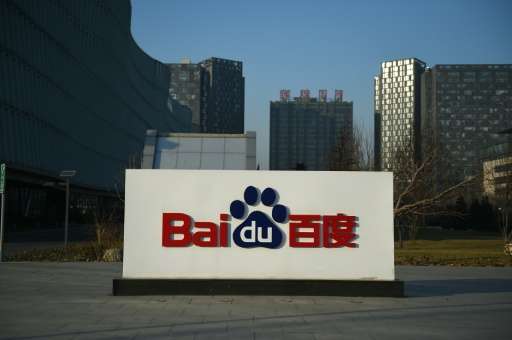Chinese search giant's model 'misleading': regulator

Internet giant Baidu, China's equivalent of Google, must change how it displays search results, regulators said Monday, following an outcry over the death of a student whose family used it to seek a cancer cure.
The ruling by the Cyberspace Administration of China (CAC) calls into question the business model of Baidu, which is quoted on the Nasdaq exchange in New York and has a market capitalisation of more than $60 billion, even after it fell heavily in the wake of the scandal.
Wei Zexi, 21, had already been diagnosed with a terminal soft tissue disease when his relatives used the search engine to find an experimental immunotherapy treatment at a Beijing hospital run by the armed police force.
Before he died, Wei denounced the firm online as "evil" and warned other cancer patients "not to be cheated" in comments that went viral, drawing an onslaught of criticism against Baidu.
"Baidu's mechanism for ranking paid results depends too heavily on price paid and does not clearly indicate paid results, as well as other problems," the CAC said in an article in its in-house newspaper.
The system "influenced the impartiality and objectivity of its search results, making it easy to mislead users, and must be immediately rectified".
In a response posted online, the Internet firm pledged to display "eye-catching" markers and warnings on advertised content and limit the proportion of paid search results to 30 percent per page.
Baidu also pledged to set up a fund of 1 billion yuan ($154 million) to compensate future victims of paid content.
During the investigation period it had removed 126 million paid results, from 2,518 medical institutions, from its searches, it said.
'Reexamine our responsibilities'
"The death of Zexi incited a huge response from all of society, and has given Baidu great momentum, triggering all Baidu staff to reexamine our responsibilities as a search engine company," said Baidu senior vice president Xiang Hailong.
The company's chief executive Robin Li, who is China's fourth-richest man worth $12.6 billion according to the latest Bloomberg ranking, was summoned by regulators as part of the probe, reports said.
Baidu is often seen as China's equivalent of Google—although the US firm is hardly a direct competitor as it is blocked on the mainland and terminated most of its operations in 2010 after controversy over the country's online controls.
Search services accounted for nearly 84 percent of Baidu's total revenues last year, the company's annual report showed.
Most of the business came from customers "who pay us a fee based on click-throughs for priority placement of their links in the search results", it said.
Baidu's lucrative online marketing business has been hugely controversial.
The company came under fire this year for selling the right to manage an online haemophilia forum to an unlicensed private hospital, which state media said used the platform for self-promotion and deleted comments that challenged its credentials.
In 2011, Baidu was forced to apologise after China's state television reported fraudulent advertisements had been posted on its platforms, ranging from phoney airline tickets to unlicensed pharmaceutical adverts.
© 2016 AFP



















